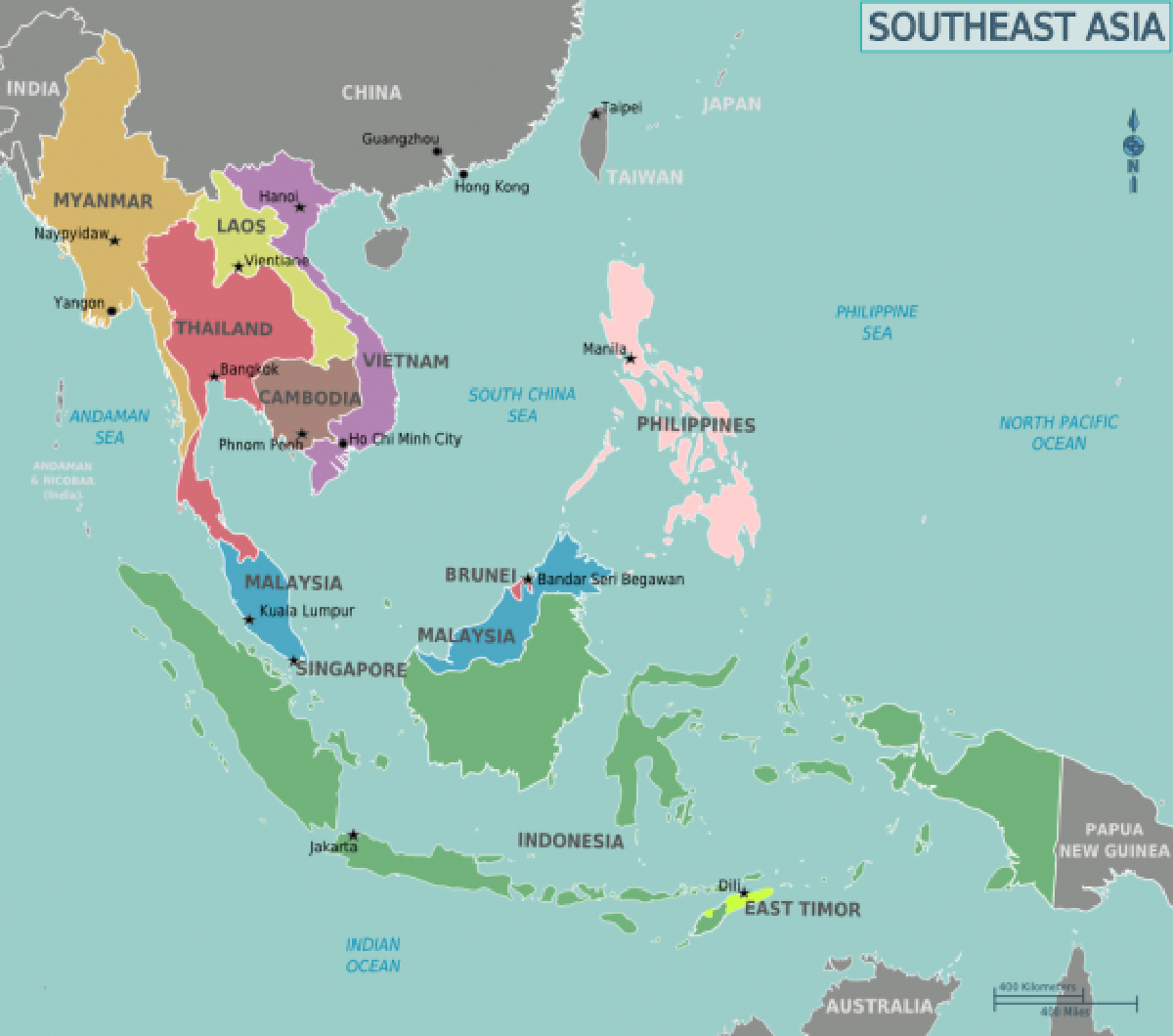Written by Lan Thuong Nguyen — Research Assistant, Institute of Information Science, Academia Sinica; PhD Candidate, International Doctoral Program in Asia-Pacific Studies, National Chengchi University.
Cover image: by Cacahuate; amendments by Globe-trotter and Texugo. Licensed under CC BY-SA 4.0. Source: Wikimedia Commons.
As research becomes increasingly data-intensive, the need for structured Research Data Management (RDM) has grown more urgent. RDM enhances the organization, preservation, and sharing of digital data across the research lifecycle, reinforcing research quality, transparency, and collaboration. Effective RDM is now seen as integral to research excellence and institutional accountability (Mavodza, 2022). While universities globally are implementing strategic RDM frameworks and service models, Southeast Asian institutions continue to face infrastructural gaps, often relying on libraries as their primary support hubs for data management.
Academic libraries are increasingly expected to move beyond their traditional roles to support evolving research practices, particularly in RDM (Priyanka et al., 2023). This transition demands enhanced data literacy among librarians to enable effective data curation and reuse. However, RDM engagement remains limited, with many librarians involved only sporadically—a trend noted in earlier studies (Federer, 2016; Masinde et al., 2021). While most Southeast Asian institutional libraries report offering RDM services, actual implementation remains minimal and infrequent, reflecting ongoing gaps in practice despite growing awareness (Priyanka et al., 2023).
In Southeast Asia, in terms of RDM, academic libraries tend to prioritize activities such as managing data repositories, offering data management training, maintaining web-based resources, conducting data studies, and promoting awareness of reusable data sources. However, they are comparatively less engaged in providing advisory services on data analysis, mining, and visualization, as well as in supporting research reproducibility, workflow transparency, and integrity—trends previously identified by Cox and Pinfield (2014). Regarding skill development for effective RDM, Priyanka et al. (2023) highlight that familiarity with metadata standards and the ability to identify suitable repositories across disciplines are viewed as the most essential competencies. Other important skills include creating data management plans (DMPs), developing repository infrastructures, and applying advanced techniques such as deep learning (Chiware, 2020).
Southeast Asian academic libraries face several barriers to implementing Research Data Management (RDM), including limited awareness, inadequate staffing, poor infrastructure, and insufficient funding. A key constraint is the absence of clear policies and institutional roadmaps. Although Adam et al. (2019) do not explicitly link RDM challenges to broader research conditions, they highlight how underinvestment in higher education and research infrastructure constrains workforce capacity and technological development, indirectly limiting RDM progress. Similarly, Nwabugwu and Godwin (2020) emphasize that external pressures to adopt RDM without adequate internal readiness can result in fragmented strategies and poor institutional coordination. Masinde et al. (2021) further underscore the ongoing challenges, including policy gaps, low technical skills, a lack of collaboration, and ethical concerns surrounding data sharing. Together, these studies suggest that structural limitations in research ecosystems significantly hinder the effective adoption of RDM in developing countries.
To provide a more comprehensive insight into Research Data Management (RDM) practices in Southeast Asia, this study conducts an in-depth analysis of five representative countries: Singapore, Indonesia, Malaysia, Thailand, and Vietnam.
Singapore#
Singapore has established a comprehensive open science and innovation ecosystem that facilitates data sharing, collaboration, and increased accessibility to research1. Key institutional repositories, such as the National University of Singapore’s (NUS) ScholarBank and Nanyang Technological University’s (NTU) Digital Repository, support open access to scholarly outputs and are cataloged by the National Research Foundation to promote academic transparency. Additional platforms, including data.gov.sg, enhance access to government datasets for research and policymaking, while initiatives such as the [Open Innovation Platform] (https://www.imda.gov.sg/how-we-can-help/open-innovation-platform) (OIP) and the Open Digital Platform (ODP) foster public-private collaboration and smart city integration. A_StartCentral (ASC) further supports deep-tech startups2 through resource sharing and technical mentorship.
Singapore is currently the only Southeast Asian country with a systematic Research Data Management (RDM) policy framework in place. Since 2005, academic libraries have led the establishment of institutional repositories (IRs) to support open access and data stewardship, beginning with the National Institute of Education (NIE), followed by NTU in 2009, NUS and Singapore Management University (SMU) in 2010, and most recently the Singapore Institute of Technology (SIT) in 2021 (Yeo, 2022). These repositories utilize various platforms, including DSpace (utilized by NIE, NUS, and NTU with vendor support), Digital Commons (utilized by SMU), and Figshare (utilized by SIT). In parallel, universities have introduced formal RDM policies—NTU in 2016, NIE in 2017 (revised in 2021), SMU in 2020, and SIT in 2021—developed collaboratively by libraries, research offices, and academic units to align with institutional priorities (Yeo, 2022). Efforts are ongoing across institutions to expand and refine these frameworks.
Indonesia#
Although Indonesia lacks a formal national policy on open science, it has emerged as a regional leader in open-access publishing through institutional and national efforts. The launch of the National Scientific Repository (RIN) in 2019, under a new science law3 modeled after platforms like DANS4, marked a key step toward centralizing research data and promoting transparency and reproducibility (Dzulfikar, 2019; Stewart, 2023). Despite ongoing challenges such as data quality, researcher awareness, intellectual property issues, and weak regulatory enforcement (Zein, 2018), Indonesian universities and government agencies have actively supported open-access journals—often managed via the Public Knowledge Project’s Open Journal Systems (Irawan, 2024). Notable examples include IJoST5, Catalyx (Journal of Process Chemistry and Technology), and Communica (Journal of Communication)6. Additionally, preprints are gaining traction as tools to accelerate the dissemination of knowledge (Irawan et al., 2022). The government is also exploring alignment with UNESCO’s Open Science framework to enhance openness and infrastructure (Stewart, 2023). Collectively, these efforts reflect Indonesia’s increasing commitment to building a transparent and collaborative research environment.
Malaysia#
The Malaysia Open Science Platform (MOSP), led by the Ministry of Science, Technology, and Innovation (MOSTI) and implemented by the Academy of Sciences Malaysia (ASM) (Malaysia Open Science Platform, 2020), represents a national effort to advance Open Science through FAIR data principles—Findable, Accessible, Interoperable, and Reusable. Launched in 2019, the MOSP Pilot Initiative (2020–2022)7 involved five major research universities and focused on policy development, capacity building, and infrastructure design. A key outcome was the establishment of the Malaysia Open Science Alliance (MOSA), a multi-stakeholder body that promotes trust and collaboration in data sharing. The initiative developed national guidelines through stakeholder consultations, launched training programs for data professionals, and created technical frameworks for the MOSP prototype, utilizing both local expertise and international models. Overall, MOSP aims to enhance research integrity, promote data openness, and strengthen Malaysia’s global research standing.
Thailand#
Thailand has developed a supportive legal and institutional framework for open government data, aiming to enhance transparency, digital governance, and public access. Laws such as the 2017 Constitution, the Official Information Act (1997), and the Digital Services and Management Act (2019) mandate the disclosure of public data in digital formats8. In 2020, the Digital Government Development Committee introduced guidelines for standardized data publication via the national portal (data.go.th), improving accessibility and interoperability. In the research domain, the National Research Agency (NRA) plays a central role in developing ethical standards, data governance frameworks, and innovation databases to support national development and the digital economy. However, challenges remain in implementation, capacity building, and stakeholder engagement. Thailand is also promoting open science through initiatives such as ThaiScience, the Thailand Consortium Agreement with ACS Publications, the Thai National Research Repository (TNRR), and platforms like Science Essence Journal9 and Technology and Health Review10. These efforts aim to broaden access to scientific knowledge and foster a collaborative research ecosystem.
Vietnam#
Vietnam is making gradual progress toward open science through emerging platforms and policy reforms that aim to enhance transparency, collaboration, and innovation. Key initiatives, such as OpenScience.vn and the VAST Journals System (VJS)11, promote open-access publishing and data sharing in line with the National AI Strategy for 2030 (HAUI, 2024). A draft Decree on Shared Databases further signals growing institutional recognition of data’s role in digital transformation. Nonetheless, challenges persist, including fragmented databases, limited awareness, and inconsistent policy coherence. While government strategies increasingly emphasize the commercialization of research and academia-industry links (Ministry of Science and Technology, 2025), public understanding of open science remains low, as noted by Phan Thị Hà Dương during the “Open Science from Perspectives” workshop (VietnamNews, 2023). Bottom-up initiatives by groups like AVUC and universities such as Phenikaa and Thanh Do have strengthened infrastructure and training, contributing to a rise in open-access publications—from 25% in 2011 to 43% in 2021 (Pham, 2022). However, barriers such as the exclusion of Article Processing Charges (APCs) from funding and disciplinary skepticism continue to hinder adoption. Experts recommend integrating open science into national strategies, expanding support for APCs, and embedding it into academic curricula to ensure its sustainable implementation.
To enhance the implementation of Research Data Management (RDM) in the region, it is essential to establish well-defined policy frameworks, invest in capacity-building initiatives for data professionals, and encourage ethical and transparent data-sharing practices. Advancing institutional commitment and promoting cross-border collaboration can further contribute to a more integrated and effective research data management (RDM) environment.
Reference#
- Adams, J., Pendlebury, D., Rogers, G., & Szomszor, M. (2019). Global research report – South and Southeast Asia. Retrieved from ISI_Global_Research-Report-5_v10_RGB_SP.pdf
- Chiware, E. R. T. (2020). Data librarianship in South African academic and research libraries: a survey. Library Management, 41(6/7), 401-416. Retrieved from doi: 10.1108/LM-03-2020-0045.
- Cox, A. M. & Pinfield, S. (2014). Research data management and libraries: Current activities and future priorities. Journal of Librarianship and Information Science, 46(4), 299–316, doi: 10.1177/0961000613492542.
- Dzulfikar, L. T. (November 10, 2019). Indonesia’s first scientific data bank is a step towards strengthening ‘open data’ practices. The Conversation. Retrieved from Indonesia’s first scientific data bank is a step towards strengthening ‘open data’ practices
- Federer, L. (2016). Research data management in the age of big data: Roles and opportunities for librarians. Information Services and Use, 36(1/2), 35-43, doi: 10.3233/ISU-160797.
- HAUI. (2024). Seminar on the introduction and utilization of the openscience.vn platform. Retrieved from Seminar on the Introduction and Utilization of the openscience.vn Platform
- Irawan, D. E. (December 11, 2024). The thwarted progress of open access in Indonesia. Katina. Retrieved from The Thwarted Progress of Open Access in Indonesia | Katina Magazine
- Irawan, D. E., Zahroh, H., & Puebla, I. (2022). Preprints as a driver of open science: Opportunities for Southeast Asia. Front Res Metr Anal,7. Retrieved from Preprints as a driver of open science: Opportunities for Southeast Asia - PMC
- Masinde, J., Chen, J., Wambiri, D. and Mumo, A. (2021). Research librarians’ experiences of research data management activities at an academic library in a developing country. Data and Information Management, 5(4), 412-424, doi: 10.2478/dim-2021-0002.
- Mavodza, J. (2022). Research data management: A review of UAE academic library experience. Open Information Science, 6(1), 16–27, doi: 10.1515/opis-2022-0128.
- Ministry of Science and Technology. (2025). Opportunities to unleash Vietnam’s potential in developing science, technology, innovation. Retrieved from Opportunities to unleash Vietnam’s potential in developing science, technology, innovation
- Nwabugwu, M. & Godwin, L. (2020). Research data management (RDM) services in libraries: lessons for academic libraries in Nigeria. Library Philosophy and Practice, 1.
- Open Science. (2020). What is Malaysia open science platform? Retrieved from What is Malaysia Open Science Platform? – Malaysia Open Science Platform (MOSP)
- Pham, H. (November 19, 2022). How to move open science from the periphery to the centre. University World News. Retrieved from How to move open science from the periphery to the centre
- Priyanka S., Subaveerapandiyan, A., & Manoj, K. S. (2023). Research data management services in academic libraries: A comparative study of South Asia and Southeast Asia. Global Knowledge, Memory and Communication, 74(3/4), 777-793. Retrieved from https://www.emerald.com/insight/2514-9342.htm
- Stewart, B. (2023). A case for open science in Indonesia: Advancing digital literacy, scientific infrastructure, and leadership. Jakarta: Centre for Strategic and International Studies (CSIS).
- VietnamNews. (2023). Exploring open science in socio-economic development. Retrieved from Exploring open science in socio-economic development
- Yeo, P. P. (2022, August 23). Open access in Singapore [IFLA Academic and Research Libraries Section Blog]. Retrieved from Open access in Singapore | IFLA Academic and Research Libraries Section Blog
- Zein, R. A. (November 16, 2018). Cobra effect, Indonesian lecturers obsessed with Scopus index and despicable practices towards world-class universities. The Conversation. Retrieved from Efek kobra, dosen Indonesia terobsesi pada indeks Scopus dan praktik tercela menuju universitas kelas dunia
- Zein, R. A. (November 16, 2018). Cobra effect, Indonesian lecturers obsessed with Scopus index and despicable practices towards world-class universities. The Conversation. Retrieved from Efek kobra, dosen Indonesia terobsesi pada indeks Scopus dan praktik tercela menuju universitas kelas dunia
Deep-tech startups are early-stage companies that develop innovative technologies rooted in scientific research and engineering breakthroughs. For more information, please visit What is deep tech? | Definition from TechTarget ↩︎
Please find more information about Indonesia’s new science law at this page Hukumonline Pro - Undang-Undang Nomor 11 Tahun 2019 ↩︎
Data Archiving and Networked Services – Dutch national centre of expertise and repository for research data at DANS | Centre of expertise & repository for research data ↩︎
A peer-reviewed publication by Universitas Pendidikan Indonesia that disseminates research across diverse fields of science and technology. Retrieved from Indonesian Journal of Science and Technology ↩︎
Catalyx and Communica also demonstrate a strong commitment to open access by making their articles freely available to the public. Retrieved from IDSCIPUB Journals ↩︎
What is Malaysia Open Science Platform? Retrieved from What is Malaysia Open Science Platform? – Malaysia Open Science Platform (MOSP) ↩︎
For more information about “Open Data” of Thai, please visit this page OPEN DATA National Research Agency (NRA) ↩︎
The Science Essence Journal. Retrieved from About the Journal | Science Essence Journal ↩︎
Thai Science, Technology and Health Review. Retreieved from About the Journal | Thai Science, Technology and Health Review ↩︎
For more information, please visit this page VAST JOURNALS SYSTEM ↩︎


